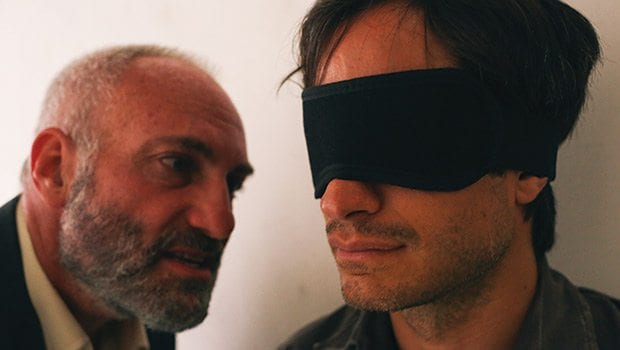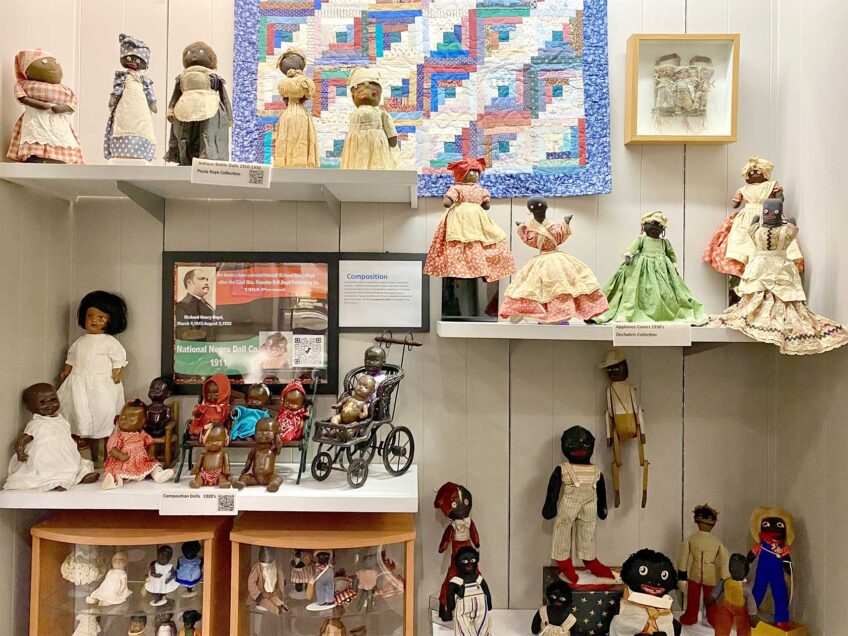

Maziar Bahari (portrayed by Gael Garcia Bernal) was jailed after filming anti-government protests in Iran.
Imprisoned in solitary confinement for 118 days in Tehran’s Evin Prison, journalist Maziar Bahari’s true story comes to light in the upcoming film Rosewater opening this Friday. The film, based on Behari’s New York Times best-selling memoir, Then They Came for Me: A Family’s Story of Love, Captivity and Survival, marks Jon Stewart’s screenwriting and directorial debut.
The film features an international cast with Gael García Bernal portraying Behari, Shohreh Aghdashloo (24 and House of Sand and Fog) as his mother Moloojoon and Kim Bodnia as his interrogator, Rosewater.
In June of 2009, the Tehran-born Bahari returned to Iran to cover the presidential elections between incumbent Mahmoud Ahmadinejad and his challenger Mir-Hossein Mousavi. While there, Behari captured footage of Mousavi’s supporters in the streets protesting and rioting against Ahmadinejad’s premature victory announcement. He submitted the footage to the BBC and was subsequently arrested and imprisoned by the Revolutionary Guard police.
Four months later, in October 2009, Bahari was finally released after an unrelenting international campaign led by his wife and his colleagues at Newsweek to Western media outlets and to the U.S. government about his wrongful imprisonment.
In town to promote the upcoming release of Rosewater, Maziar Bahari spoke to the Banner about being imprisoned in Iran and how he found the strength to survive.
How does it feel to have your life by someone else portrayed on screen?
Maziar Bahari: It’s always weird to have your life portrayed. Usually it’s about someone like Nelson Mandela with a man of that stature and who’s dead. For me it’s a mixed feeling because I’m happy that I’m not dead, and I’m not Nelson Mandela.
What was it about Gael García Bernal that he was chosen to portray you?
MB: Because he’s a good actor. I think what Jon wanted was the character to have this combination of being a good actor, of course, but also someone who would not be portrayed as a victim even in the worst parts of the ordeal, and someone who would retain a sense of mischief throughout the film and throughout the experience.
One of the things that struck me in the film was how polite your character, [in essence] you, were during the time of your imprisonment.
MB: I believe that in general there’s no point in being angry and impolite and provoking people. I thought you should always be polite to people even when you’re tortured. In prison that’s what they want you to be. They want you to obey their wishes, and you have to choose your battles when you’re in a situation like that. They wanted me to name names. They wanted me to admit that I was a spy. I had to choose my battles. I didn’t want to name names and I didn’t want to admit that I was a spy because I knew that would be my end. So, what I did was that I pretended I was polite. I had perfect behavior. I tried not to be provocative and at the same time I tried to give them this bullshit information about different things including the sexual sequence in order to satisfy them with something, with some sort of story.
There’s a line in the movie that struck me: “You must not take his blood, you must take his hope.” Did they accomplish that?
MB: No, they didn’t but at certain times they did. When I called my mother and there was no response and also when I became suicidal which happened really. What happens in solitary confinement is that they deprive you of your senses. Because Evin Prison, like any modern prison, is very organized, is very clean, is very structured. It’s designed that way in order to isolate people. You cannot smell anything because it’s so clean and it’s so orderly. You cannot touch anything for the walls around you. You cannot see anything except for the walls around you. You cannot hear anything because the walls are so thick. You cannot taste anything because the food usually tastes like cardboard. You’re deprived of all your senses. Human beings are social animals. It is as if your humanity is being taken away from you.
How did the imaginary conversations with your father and sister give you strength to continue, and what did you learn about yourself from those conversations?
MB: Basically, what happens in any situation when you’re in distress, especially in solitary confinement, when you’re deprived of your senses, and deprived of your support group or people that you can contact, it either makes you delusional or it makes you more spiritual. I could hear a lot of people around me reciting the Koran because they were believers. I’m not a spiritual person. I’m not a believer. I had to tap into my inner resources. And my inner resources were basically my friends, my family and work and my cultural experiences of art, literature and film. I think a lot of conversations that I had with my father and my sister came from that experience. I just talked to them to have some sort of conversation with them.
What do you want people to take away from this film and from your story?
MB: I’d like people to understand what journalists are going through on a daily basis when they read the news. And also, I think it gives a hopeful message for young people that they can make a change, that social media can be used in a positive way for gathering information, sharing information, for mobilizing different movements. I think it’s really a film for young people in order to understand their power through social media and through information.
Rosewater opens in Boston this Friday, Nov. 14 at AMC Boston Common, Regal Fenway, Kendall Square, AMC Braintree, Landmark Embassy, and more. Rosewater has been rated R for language, including some crude references, and violent content.


![Banner [Virtual] Art Gallery](https://baystatebanner.com/wp-content/uploads/2024/04/Cagen-Luse_Men-at-store-e1713991226112-150x150.jpg)

![Banner [Virtual] Art Gallery](https://baystatebanner.com/wp-content/uploads/2024/04/Cagen-Luse_Men-at-store-e1713991226112-848x569.jpg)

